Image: Lord Neuberger makes pointpublished at 11:09 GMT 6 December 2016
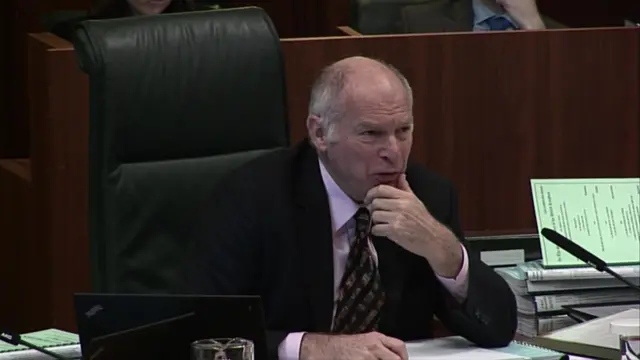 Image source, Supreme Court
Image source, Supreme CourtLord Neuberger raises an issue during Tuesday's proceedings
Supreme Court case ends with reminder it's not about stopping Brexit
Government appealed against ruling it needs MPs' approval to trigger Brexit
Judgement is expected in January
Watch highlights of each day via clips above, or scroll down to see how events unfolded
Jackie Storer and Alex Hunt
 Image source, Supreme Court
Image source, Supreme CourtLord Neuberger raises an issue during Tuesday's proceedings
Some of the proceedings so far have been rather arcane but James Eadie helpfully takes us to the nub of current political debate by talking about what will happen if the government loses the Supreme Court appeal.
The government lawyer, who has referred to the political arguments "raging in the country", says the likelihood is that if Theresa May loses the case she will submit a very short bill to Parliament to seek its approval to trigger Article 50.
Quote MessageIf the Supreme Court decides against our arguments here, the solution in legal terms is a one-line act. It may be that it would lead to all kinds of parliamentary complications and possible additions and amendments but that is the solution."
The justices are focusing on the government's intention when it passed legislation paving the way for this year's EU referendum.
Lord Mance wants some clarity on whether the government believed the 2015 Referendum Act gave it the authority to proceed with exit - by invoking Article 50 - without further reference to Parliament.
Government lawyer James Eadie says it is significant that the referendum was preceded by primary legislation.
Whether the act was "silent or not" on this specific point, he argues, he believes that MPs knew that when the law was passed the only way of implementing a Leave vote was through invoking Article 50 and that this "mandated process" would involve the use of prerogative powers.
Quote MessageMy case is that the 2015 Act involved Parliament deciding to put to the final decision of the people the in-out question. We do respectfully submit therefore that whether it said things or didn't say things, it still carries real constitutional significance."
Government lawyer James Eadie is being pressed on the amount of involvement Parliament will have in the process of the UK leaving the EU in the years ahead.
He brings up the Great Repeal Bill - a piece of legislation that Theresa May has proposed that would effectively rescind the 1972 European Communities Act - the law that paved the way for the UK to join the EU.
While it cannot be taken for granted that the Bill will be passed, he says the fact that it is being proposed at all is "relevant as a fact" and shows that the argument that Parliament will not have a substantial role "cannot be sustained".
"If we are withdrawing, as we are, the giving of Article 50 notice will not as it were involve a leaving without further Parliamentary involvement."
But several justices seem sceptical about this, Supreme Court president Lord Neuberger arguing that Parliament "can always be involved if it wants to be".
And Lord Sumption says that the existence of a Great Repeal Bill is "valuable to know but it has no legal significance" - and the judges can't take it into account when deciding who has the right to trigger Article 50.
Mr Eadie, who is one one of the government's chief lawyers, says he still has quite a lot of headway to make this morning.
Remember he is appealing to the Supreme Court to overturn last month's High Court ruling - which stated that only Parliament had the authority to invoke Article 50 - commencing the process of the UK's withdrawal from the EU.
Mr Eadie is summarising some of the arguments he made yesterday about the government's right to act through prerogative powers.
He argues these powers "continue to be available and are recognised as continuing to be available" with regard to all matters on the "international plane", including withdrawal from the EU.
The 11 justices arrive in court, taking their seats only a minute late.
James Eadie, for the government, begins again, starting by referring to documentation that was requested by the justices yesterday and their whereabouts.
He says notes have been provided about a number of relevant laws, including a memo on the 2010 Constitutional Reform and Governance Act and a Commons statement on the proposed Great Repeal Bill.
Lady Hale notes that she doesn't seem to have the note on the Great Repeal Bill and learning that Lord Neuberger has two copies, agrees to do a swap.
There was some uncertainty as to whether today's hearing would start on time as one of the justices had a medical appointment.
But with five minutes to go before the appointed start time of 10.15 GMT, many of the main protagonists - including lawyers James Eadie, Jeremy Wright and Lord Pannick - are already in their places.
We await the arrival of the 11 justices, however...
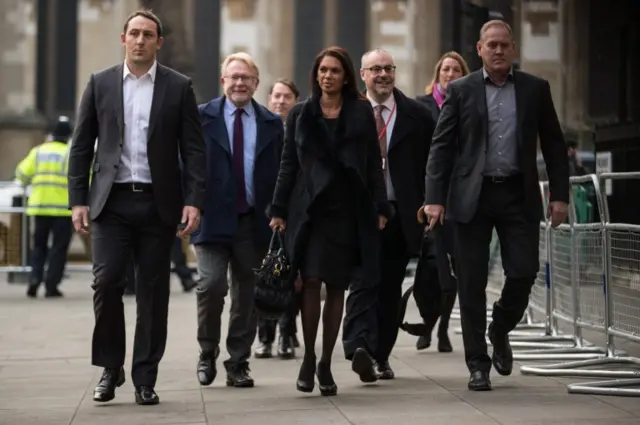 Image source, Getty Images
Image source, Getty ImagesSo what can we expect on the second day of the Supreme Court hearing?
The court will start where it left off on Monday, hearing from the government counsel James Eadie QC.
He spent much of yesterday explaining why the use of prerogative powers in relation to triggering Article 50 would be both lawful and in keeping with constitutional practice. Expect him to develop that argument a litle bit further.
Before lunch, we could also hear from Lord Keen, the Advocate General for Scotland, for the first time.
The peer and QC advises the UK government on legal matters in relation to Scotland and, in that capacity, he is expected to argue against the Scottish government's call for Holyrood to be consulted before Brexit talks begin.
In the afternoon, the Northern Ireland Attorney General John Larkin is scheduled to address the court. Remember, as well as the core challenge to the government's approach mounted by Gina Miller, there are two other challenges by Northern Ireland campaigners about the involvement of the UK Parliament and the Northern Ireland Assembly in the Brexit process.
His representations will cover this and wider issues relating to the Stormont devolution settlement and constitutional status of Northern Ireland.
Finally, we are expected hear from Lord Pannick, who is heading Gina Miller's legal team, for the first time.
The eminent QC and academic is likely to take the government's arguments head on as he seeks to argue that for MPs and peers not to give their explicit consent to Article 50 would be a breach of parliamentary sovereignty.
With the government's battle over Article 50 going to the Supreme Court, there has been much comment about the gender and ethnic make-up of the judges and barristers at work. But how "diverse" is the legal profession?
Read MoreBarnsley Central Labour MP Dan Jarvis says he will respect the views of his constituents if Parliament votes to trigger Article 50, despite being in favour of remaining himself.
"They have sent me to Parliament to make sure their voice is heard," he told BBC Radio 5 live. "I couldn't look them in the eye... if I didn't respect that."
Jarvis was responding to a constituent who said he voted to join the European community in the 1970s, but had since voted Leave because it wasn't "what we've got now".
Allow X content?
This article contains content provided by X. We ask for your permission before anything is loaded, as they may be using cookies and other technologies. You may want to read X’s cookie policy, external and privacy policy, external before accepting. To view this content choose ‘accept and continue’.
Allow X content?
This article contains content provided by X. We ask for your permission before anything is loaded, as they may be using cookies and other technologies. You may want to read X’s cookie policy, external and privacy policy, external before accepting. To view this content choose ‘accept and continue’.
 Image source, PA
Image source, PADutch finance minister Jeroen Dijsselbloem has dismissed suggestions that the UK, in the words of a recent memo, will be able to "have their cake and eat it" when it comes to trade and immigration controls after Brexit.
Speaking ahead of a meeting of EU finance ministers in Brussels, he said there are "options that are not available" to the UK in upcoming negotiations.
The Dutch politician called on the British government to rethink its approach to what it could get out of Brexit to ensure a smooth departure.
Quote MessageIf the UK wants to have full access to the internal market they will have to accept the rules and regulations that go with that internal market.
Quote MessageIt can be smooth, and it can orderly, but it requires a different attitude I think on the part of the British government, because things that I’ve been hearing so far are incompatible with smooth and incompatible with orderly."
 The Guardian
The Guardian
The chief negotiator in Brussels preparing to tackle Brexit is due to make a statement today, according to The Guardian, external.
Michel Barnier, a former French foreign minister, has remained tight-lipped since he got his job in October but has poked a little fun at the UK - his tweet outside the museum of broken relationships raised a chuckle or two.
But today he is expected to say the bill for leaving would total between €55 billion and €60 billion (£46 billion to £51 billion).
 Today Programme
Today Programme
BBC Radio 4
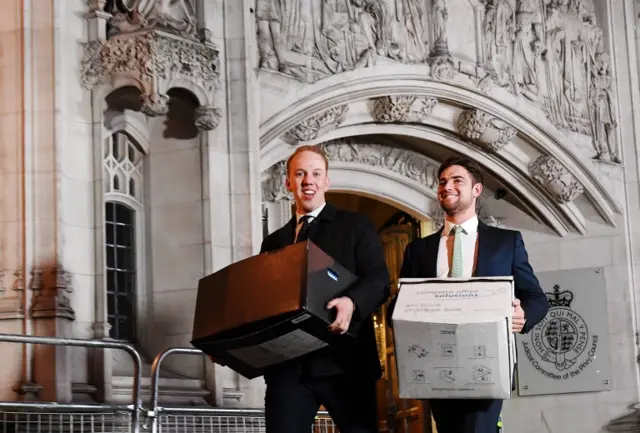 Image source, EPA
Image source, EPATV critic Kevin O'Sullivan was unimpressed by yesterday's Supreme Court hearing, saying it was the "driest four and a half hours of television" he had ever seen and, in his opinion, completely lacking in drama.
Speaking on Radio 4's Today, he suggests James Eadie, one of the government's chief lawyers who took centre stage yesterday, had "sucked the life" out of the Brexit debate by "making the same point over and over again".
There were some unintentional comical moments, he concedes, with the justices arguing over what, in his words, was in "bundle 18 and tab 202" but he says the tone of the proceedings were in complete contrast to the "high drama" outside the court - where there was a constant cacophany of noise and protests, among others, by campaigners wearing wigs.
Lisa Holdsworth, a scriptwriter whose credits include New Tricks and Waterloo Road, says the proceedings could be distilled into a work of theatre but were unlikely to be dramatised on the small screen any time soon.
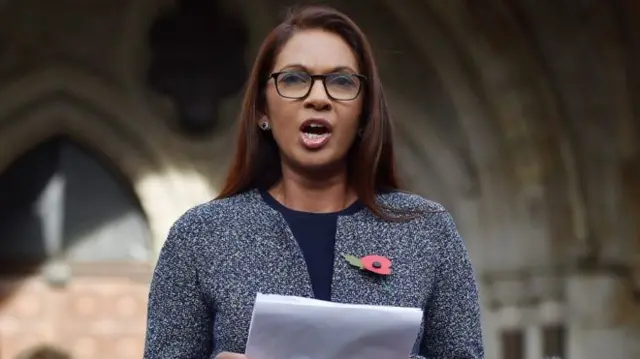 Image source, EPA
Image source, EPAGina Miller has arrived at the Supreme Court in time for day two, but who is the woman who has become the face of the Article 50 court case?
BBC Home Affairs correspondent tweets...
Allow X content?
This article contains content provided by X. We ask for your permission before anything is loaded, as they may be using cookies and other technologies. You may want to read X’s cookie policy, external and privacy policy, external before accepting. To view this content choose ‘accept and continue’.
But will it be with a hard or soft boiled egg?
 Norman Smith
Norman Smith
Assistant political editor
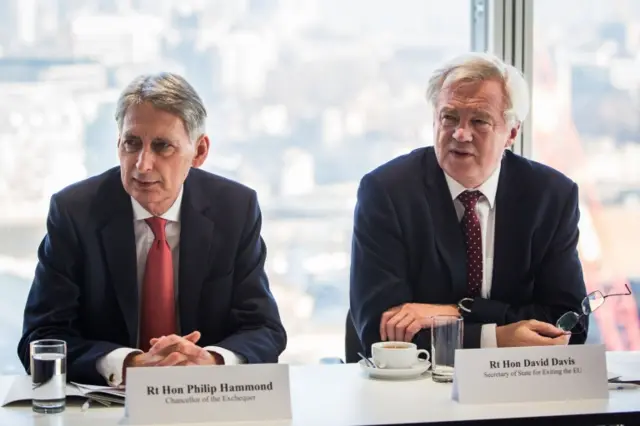 Image source, PA
Image source, PAChancellor Philip Hammond has said the government will keep its options open over continuing to pay money in to the EU for access to the single market.
Ministers would "look at the costs and benefits" from continued payments to the EU after the UK leaves the organisation, he said.
Brexit Secretary David Davis first floated the idea last week, a move which alarmed some prominent Brexit supporters.
Foreign Secretary Boris Johnson has also sounded lukewarm about the idea, suggesting the government should only consider paying in for smaller EU schemes such as the Erasmus student exchange programme.
Mr Hammond also suggested the EU could lose out if the City was damaged in any Brexit deal, saying the City played "a vital role in the European economy".
Theresa May says she is "ambitious" about the deal the UK will strike when leaving the EU.
Read MoreBBC assistant political editor tweets...
Allow X content?
This article contains content provided by X. We ask for your permission before anything is loaded, as they may be using cookies and other technologies. You may want to read X’s cookie policy, external and privacy policy, external before accepting. To view this content choose ‘accept and continue’.
The NI executive should prioritise continued membership of an EU customs union, says a think tank.
Read More